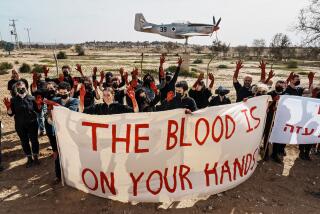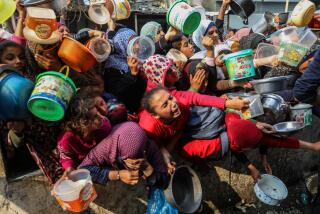A mutual passion for the Middle East, and a divide
I am a Jew, but also part Palestinian, and pretty much part Lebanese. My great-grandmother, a Jew, was born in northern Palestine and grew up in Beirut. Her first language was Arabic, her second French. By the rules defining who can be called an Arab, she was one: a child of the Arabic tongue. My great-grandfather too. Another Jew, he was born in Safed and grew up in Alexandria; first language, Arabic. They married in Beirut. When they arrived at Ellis Island, in 1896, they were classified as Turks.
By the time I was born, no one in my family talked about this. My first hint was the word my mother used for eggplant, which sounded like “battenjam.” Thirty years later, I discovered in a book by Palestinian intellectual Edward Said that the Arabic word for eggplant was badinjan. It was as if I had suddenly dipped the madeleine in my tea: A world opened before me.
Where my ancestors came from matters, because in the Middle East -- which I love completely -- everything is geographical. In “A World I Loved: The Story of an Arab Woman” (Nation Books: 208 pp., $14.95 paper), Wadad Makdisi Cortas, born in 1909, manifests a similar love, inflamed yet tempered by loss. As I read her book, I kept thinking: This is my country too. And yet for Cortas, the greatest disaster was the founding of Israel -- also, supposedly, my country.
Everything’s geographical in the Middle East, and personal too: I have a personal interest in Cortas. She is the mother of my longtime acquaintance Mariam Cortas Said and the mother-in-law of Mariam’s late husband, that same Edward Said. (The central figure in my novel about Jerusalem, “Martyrs’ Crossing,” is based in part on him.)
The Makdisis and Saids form an intermarried intellectual dynasty. Edward was one of the commanding Arab thinkers of our era. His sister, Jean Said Makdisi, wrote a stunning memoir of the Lebanese civil war called “Beirut Fragments.” Her son Saree, who teaches at UCLA, wrote “Palestine Inside Out: An Everyday Occupation.” All were or are teachers or professors -- educators at heart.
Cortas is an emblematic figure of this family. One of the early educated women of the Arab world, she studied in the U.S. and Paris before returning to Beirut. There, she became a teacher, and then, for 40 years, headmistress of Beirut’s Ahliah School for Girls, where she had studied and taught. As “A World I Loved” proceeds, this sober figure rules over generations of Middle Eastern girls during waves of crises: Cortas had refugees from everywhere in her school, most notably Palestine and North Africa. She is a Miss Jean Brodie in Beirut; throughout the book, you can feel that headmistress’ finger wag.
Cortas’ view is strictly Lebanese, inherited from her father, a patriot and educator. She describes him sitting by the wireless, listening to the BBC during World War II, rooting for the Allies, “waiting impatiently every morning for Churchill’s voice.”
Here is a family that has participated in our contemporary Western world. So when Cortas describes the creation of Israel -- the naqba, or catastrophe, as the Arabs call it -- from a Lebanese perspective, we are able to remain open to her point of view. “Is it true,” one of her Palestinian students writes home, that “our house is now empty and new people have taken possession of it?” Cortas’ is a bracing and uncomfortable look at how this event was perceived in the Arab world.
Reading “A World I Loved,” I could not help recalling another memoir of this era, “A Tale of Love and Darkness” by the Israeli writer Amos Oz. While Cortas is trembling in her home, wondering what the naqba will mean for her and her baby, Oz, a small boy, is being hoisted onto his father’s shoulders in the midnight streets of Jerusalem to celebrate Israel’s creation. Cortas’ world begins to disappear as Oz’s constructs itself. The two memoirs echo each other -- the records of two humanists trying to understand what human history has done to their lives.
Nowhere has the aftermath of these events played out with more consistent brutality than in Beirut. History is still being written across the face of the city, in craters and ruins fashioned by the grenades and mortar rounds of Lebanon’s long civil war. “A shifting landscape of memories and sorrow. . . “ Jean Said Makdisi called the city’s pockmarked boulevards. In “A World I Loved,” Cortas recalls the early years of that war (she died in 1979): the armed men knocking at the door, the polarizing divisions in a once unified city, the politicizing of the American University, the students at Ahliah who begin to advocate violence, the deaths every day.
But her troubling memoir is also suffused with a longing for the past. The loss of the old world is palpable, whether in a description of her summer house in the mountains at Brummana -- “the entrance hall ceiling was supported by old pine beams and led into rooms outfitted with books and rugs and comfortable chairs” -- or in her students’ upended lives. Her story, first published in Arabic in the 1960s, may center on the educated Levantine elite, but it reflects too, the losses of the wider Arab populations.
I had always wanted to see Beirut, and in 1997, when I was living in Jerusalem, I finally did. It wasn’t easy. I had to travel first to Amman, the capital of Jordan, and fly from there to Beirut. A trip that should take three hours by car took me two days. I spent part of one day getting a “clean” U.S. passport, free of Israeli customs stamps. In this region, history seeps into the least of plans.
Almost 20 years after Cortas’ death, Beirut was in the middle of a boom. Then the prime minister was assassinated, and the populace found itself once again in fear. Such a zigzag continues even now, with Lebanon entering another hopeful moment.
Cortas’ book can be read not just as a historical document but as a corrective to the loss of hope. “To me,” she writes, “a school was primarily a human institution, and a human approach took precedence over all other considerations.” By “all other considerations,” she means politics. Substitute “nation” for “school” and you might have a recipe for peace.
“We had no strangers in our midst,” she says of a school where children came from around the world. “The more we lived together, the more we discovered the sublime human bonds that linked us.” Today, of course, the hard part in the Middle East is pulling people together who are trying so hard to live apart.
Wilentz is the author, most recently, of “I Feel Earthquakes More Often Than They Happen.” She teaches in the Literary Journalism program at UC Irvine.
More to Read
The biggest entertainment stories
Get our big stories about Hollywood, film, television, music, arts, culture and more right in your inbox as soon as they publish.
You may occasionally receive promotional content from the Los Angeles Times.






